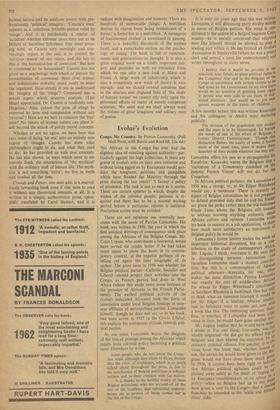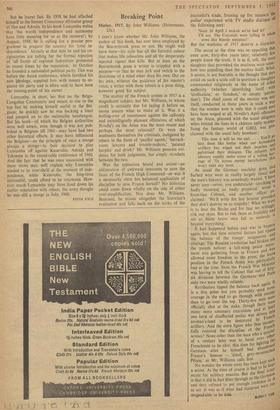Evolue's Evolution
`No African in the Congo has ever had the slightest idea of rebelling against authority—par- ticularly against the high authorities. Is there any group of evohres who on their own initiative and without being egged on by Europeans would pro- duce the telegrams, petitions and pamphlets which have flooded the Ministry through the press during the last years?' I favour a policy of prudence. The task is not as easy as it seems. There are certain spheres in which, despite the wishes of the colonial people, patience is re- quired and there has to be a normal waiting period before a particular reform is initiated. Precipitate action must be avoided.'
These are not opinions one normally asso- ciates with the name of Patrice Lumumba. His book was written in 1956, the year in which the first political stirrings of consequence took place among the Africans of the Belgian Congo. Mr. Colin Legum, who contributes a foreword, would have served the reader better if he had taken more space to place the book in its contem- porary context, at the expense perhaps of re- telling yet again the later biography of its author. The great issue in 1956 was whether the Belgian political parties—Catholic, Socialist and Liberal—should project their activities into the Congo, as French parties had done in West Africa (where this made more sense because of the presence of Africans in the French Parlia- ment). The earliest political activity of the evottres (educated Africans) took the form of association under local Belgian tutelage in over- seas affiliates of metropolitan parties. Lumumba himself, though he does not say so in his book, had been active in 1955 in the Cercle Liberal; this explains his ambiguous attitude towards poli- tical parties.
At one point Lumumba warns the Belgians of the loss of prestige among the Africans which results from colonial policy becoming a political issue. Elsewhere he writes:
Some people who do not know the Congo- lese mind, although they claim to do so, declare that the crisis of confidence, which is so much talked about throughout the press, is due to the interference of Belgian politicians in colonial matters and to their contacts with tae natives. . . . It is thanks to the healthy rivalry of these Belgian politicians, who are accused of all the sins of the Israelites, that substantial improve- ments are in process of being carried out in the life of the Congo. Lumumba is still discussing party rivalry strictly in terms of Belgian politics. His mind is con' ditioned, to the notion of a Belgo-Congolese Com- munity—he is mainly concerned that educated men like himself should be allowed to play a leading part within it. He has formed an Eyelids Association in Stanleyville (where he was a postal clerk and served a term for embezzlement) and writes throughout in elitist terms.
I believe that it would be possible in the relatively near future, to grant political rights to the Congolese elite and to the Belgians of the Congo in accordance with certain criteria to be laid down by the Government. In my view there would be no question of granting these rights to people who were unfit to use them, to dull' witted illiterates: that would be to put dan- gerous weapons in the hands of children.
A few months before this was written Kasavubn and his colleagues in Abako were declaring publicly: The division of the population into evotaes
and the mass is to be discouraged. To borrow the words of one of the wisest of Belgians, a former District Commissioner: 'Though this distinction flatters the vanity of some, it lowers them at the same time, since it makes then! deserters of their people whatever one may saY.
Lumumba offers his pen as a propagandist for Eurafrica; Kasavubu warns the Belgians that a `caricature of a Community modelled on the famous French Union' will not do for the Congolese. In African political parlance, the Lumumba of 1956 was a stooge, or, as Sir Edgar Whitehead would say, a moderate. There is scarcely an aspect of Belgian colonialism he is not prepare' to defend provided only that he and his friends are given the perks, rather than the old-fashioned Uncle Toms whom the Belgians still listened to without learning anything authentic about African culture and opinion. Lumumba wrote his book in essence as a job application, to shot how much more satisfactory an instrument of Belgian policy he would be. Lumumba's future history makes the book as important historical document, but as a cFn. tribution to the study of contemporary Africa! Mr. Legum, I think, overrates it. He says the; in distinguishing between nationalism ell, racialism Lumumba made a distinct contrth" tion. But this is a commonplace of Afriearla political utterance—Kenyatta, for one, oft! makes the same distinction. Patrice LumuM'a was exactly the sort of middle-class Africaltil for whom Sir Edgar Whitehead's constitun oi in Southern Rhodesia is fashioned. One has °11 to think what an immense triumph it would be for Sir Edgar if a leading African inteue; tual in Salisbury were to come out now' with a book like this. The interesting question, there fore, is whether, if Lumumba had been col vated in time, he would have gone another W351: Mr, Legum implies that he would have done I doubt it. For one thing, Lumumba was not wholly neglected—he did get his official trip to Belgium and then blotted his copybook by a", ordinary criminal offence. For another, it Is °b vious from this book that, whether honest or , not, the advice he would have given to the Bed glans would not have done them much g00,; In 1956, it cannot have been right to indicate that African political agitation could be plained away solely as the result of 'egging ° a by European troublemakers or to advise asrit policy- -when no Belgian had up to this P°,1 been given a vote in the Congo— that a 1101,Ite„ efrianeev alike. extended to the 'white and Africa" it But he learnt fast. By 1958 he had atfached himself to the former Conscience Africaine group of [leo and Adoula. In his book Lumumba writes that `the words independence and autonomy have little meaning for us at the moment'; by August, 1958, he is calling for a precise pro- gramme to prepare the country for 'total in- dependence.' Already at that date he and his co- signatories are calling for the formal rejection of 'all forms of regional federalism promoted in recent times by the separatists.' In October he founded a nationalist political party. This was before the Accra conference, which fortified his new ideology, supplied him with money to or- ganise his party and is often said to have been the turning-point of his career.
Lumumba, in short, bet first on the Belgo- Congolese Community and meant to rise to the top fast by making himself useful to the Bel- gians; he quickly saw he was backing a loser and jumped on to the nationalist bandwagon. But his book—of which the Belgian authorities were well aware, even though it was not pub- lished in Belgium till 1961—may have had two other historical effects. It may have influenced the Belgians—on the principle of once a stooge always a stooge—in their decision to play Lurnumba off against Kasavubu, Adoula and Tshombe in the round-table conference of 1960. And the fact that he was once associated with these views may well explain why Lumumba needed to be over-shrill at the moment of inde- pendence, while Kasavubu, the long-term nationalist, could afford to be courteous. How- ever much Lumumba may have lived down his earlier reputation with others, the army thought he was still a stooge in July, 1960.
KEITH KYLE



































 Previous page
Previous page